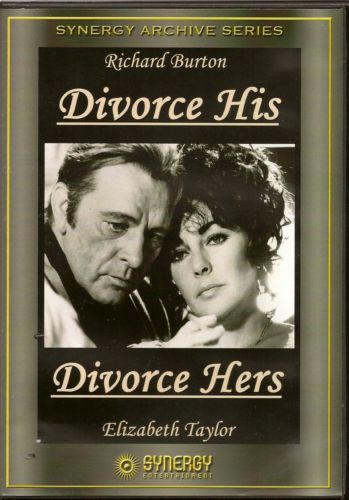
DIVORCE HIS, DIVORCE HERS
UK, 1973, 180 minutes, Colour.
Richard Burton, Elizabeth Taylor, Carrie Nye, Barry Foster, Gabriele Ferzetti.
Directed by Waris Hussein.
Divorce His, Divorce Hers is the only television film made by Richard Burton and Elizabeth Taylor. It was released ten years after they began their relationship in the making of Cleopatra. During that period they made quite a number of films together, some significant, some slight. Significant ones include Who’s Afraid of Virginia Woolf and The Taming of the Shrew. Slight ones include The Sandpiper and Boom.
The film is written by John Hopkins, the British playwright who wrote for television, especially the breakthrough miniseries Talking to a Stranger, presenting characters and situations from different points of view. He does the same thing here, the first part the break-up of an eighteen-year marriage from the perspective of the wife, then of the husband. The film was directed by Waris Hussein, born in India but who moved to the UK in the early 1960s and was soon directing episodes of Doctor Who and other television programs. He made a number of feature films in the latter part of the 1960s including Henry VIII and His Six Wives and The Possession of Joel Delaney. However, with this film he continued to make television movies during the 70s, 80s and 90s, a prolific director.
The film is a curiosity item because the marriage between Elizabeth Taylor and Richard Burton was collapsing at this time. In retrospect it has some curiosity value (and even prurient interest). However, with the length of the film, it is sometimes hard going, although it tries to explore the personalities, the relationship, the breakdown of the couple.
1. How interesting was this film? The focus and divorce a contemporary phenomena? The details of the film for a television audience? Elizabeth Taylor and Richard Burton and the background of their careers influencing the response to this film?
2. Comment on the value of the two part style. How much distance was necessary between each part? (The intrusion of advertisements on television)? Comment on the priority of divorce his over divorce hers? The use of the order of their filming. Why? Whose eyes was the marriage seen through? The emphasis on audience sympathy?
3. How well did the film indicate why the marriage broke up? Proximately, over a long period? Who was to blame?
4. The film's presentation of Reynold’s as a person, as a man, the background of the marriage? Rome and work? Friends? The encounter with Jane? His presence at the party? Their meeting and fighting? The reaction of the children? The emphasis on his career and himself?
5. The importance of the details of business, efficiency, Trenton as his secretary? The African theme, big business, dealings, meetings, being deceived, success? How was the business atmosphere to be compared with the atmosphere of the marriage?
6. The background of the social world in which they lived? The atmosphere of Rome, apartments and hotels, a governess and wealth, parties, social friends? How authentic did this seem?
7. The presentation of marriage in that atmosphere? How successful could it be?
8. The significance of Reynolds' memories: the way they were interspersed with the present, the cumulative effect? Helping in understanding Reynolds and Jane? Falling in love, meeting? The fighting and the break? The apportioning of blame? Whose view? Reynold’s soft judgement?
9. The comparison with Jane's memories and their presentation? Her view of the same memories and the effect on her life? Her understanding?
10. How much of a marriage really was it? How much love, how much romance, how much self-giving? The influence of work and separation? Separation as an excuse? The growing intensity of the fighting?